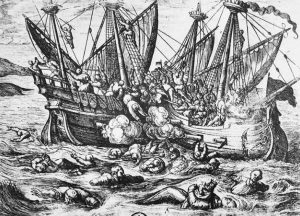New book resurrects Britain’s almost forgotten legacy as a haven for refugees
A new book traces the UK’s centuries long history as a haven for refugees, arguing that the nation has benefitted as a result.
‘The Land of Promise: A History of Refugees and Exiles in Britain’, by American academic Matthew Lockwood, is a panoramic history of Britain as the asylum capital of the world.
From French Huguenots fleeing religious persecution and royalists fleeing the guillotines of the French revolution to the Czechs and Poles fleeing soviet crackdowns and the Asian families deported from Uganda by Idi Amin, Britain has a long history of offering sanctuary to the oppressed.
One chapter of the book, in a stark comparison to current events, talks about small, crowded, leaky boat travelling from Calais towards Dover in seas that could turn from placid to deadly in a moment.
 This was 1620 and it describes the hundreds boats that crossed at the time carrying Huguenot asylum seekers fleeing Catholic France and the Lowlands.
This was 1620 and it describes the hundreds boats that crossed at the time carrying Huguenot asylum seekers fleeing Catholic France and the Lowlands.
Lockwood says more than 115,000 Huguenot refugees arrive in Britain when it’s population was just 4.5 million.
The irony of this observation is hard to miss, as right-wing anti-immigration firebrand Nigel Farage’s ancestors were among them.
The book is topical, well researched and beautifully written. It gives a broad historical perspective on one of the UKs great ethical issues.
And it provides historical context and precedence because, as Lockwood describes, most people welcomed the Huguenots and showed generosity.
But in 1592, when half of the population of Sandwich, in Kent, were Flemish refugees, the locals rioted and all the ‘alien strangers’ were forcibly expelled because they were said to be taking jobs and homes.
Lockwood also tells stories about American slaves who managed to reach freedom in Britain. At first they were welcomed but then became a political weapon by MPs wanting to demonise ‘the other’.
In 1792, At the height of the great Terror during the French revolution of the 1790s, the influx of refugees to Britain prompted the foreign secretary Lord Grenville to say most of the newcomers were ‘suspicious’.
Lockwood focuses on strong characters to make his points, sing the American slave Frederick Douglass, who fled from the US in the 1840s, to Freddie Mercury, whose parents escaped from Zanzibar in the 1960s and playwright Sir Tom Stoppard, a Czech refugee.
There is a chapter about Russian Jews escaping the pogroms of the 1890s that also follows the now familiar pattern.
At first, they were welcomed but then a politician on the make played whipped up xenophobia while also launching a racist movement called the British Brothers League.
Prompted by the movement, the government of the day proposed an ‘Aliens Bill’ – eerily similar to the pervious UK Conservative government’s plan to send asylum seekers to Rwanda – would subvert existing laws and send large numbers of Jews to the far-flung parts of the British Empire.
One of the early opponents of the Bill, Lockwood says, was a young Winston Churchill.
Then a young MP, Churchill ‘crossed the floor’ and left the Tories to join the Liberals, where he remained for 20 years.
His parliamentary speech in the House of Commons opposing the Aliens Bill would not be out of place today.












